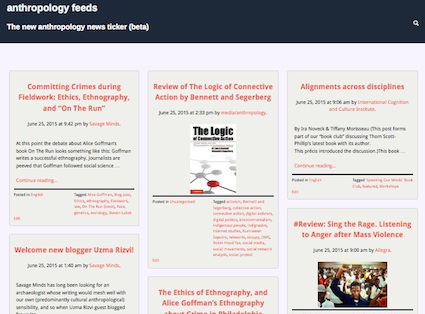Unfortunately no new content was published here last year. Nevertheless, this blog received lots of visitors. Looking at last year’s statistics about the most viewed posts and pages, I find three clear winners.
The three most viewed posts are:
1. The Five Major Challenges for Anthropology (4806 visits)
This post from 2006 is about the book Plausible Prejudice by Marianne Gullestad.To understand the problems of the world today, we need to “decolonize anthropological knowledge”, she writes.
2. Yes to female circumcision? (4254 visits)
This is also the most commented post on antropologi.info. It is about Sierra Leonean-American anthropologist Fuambai Ahmadu who attacks Western feminists, media and anti-Female Genital Mutilation campaigns and accuses them for presenting a one-sided, ethnocentric picture of female circumcision.
3. Free Open Access Anthropology Journals (3880 visits)
This is a regularily updated overview over Open Access journals in anthropology in several languages
The following posts and pages have significantly lower page views
4. Anthropologists condemn the use of terms of “stone age” and “primitive” (1508 visits)
A post about a statement by the ASA (Association of Social Anthropologists of the UK and Commonwealth) in 2007
5. The Anthropology Newspaper (1128 visits)
This pages provides an overview over the recent blog posts by anthropologists in English, German, and Scandinavian languages around the world.
6. Selected quotes from “On Suicide Bombing” (942 visits)
A post about a book by Talal Asad where he asks questions as: What actually is terrorism? What kind violence is labelled as “legitimate” and why? Is there really a big difference between soldiers at war and suicide bombers?
7. Lookism: Why we don’t want to be perceived as “ugly” or “different” (933 visits)
A review by Tereza Kuldova of “The Power of Looks. Social Stratification of Physical Appearance” by Bonnie Berry
8. Why anthropologists should become journalists (912 visits)
A post about an article by Brian McKenna in Counterpunch where he writes: “We need courses and programs in “Anthropology & Journalism” to help create the critical public intellectuals of the 21st century.”
9. Why we need more disaster anthropology (833 visits)
A post about Uy Ngoc Bui’s master’s thesis about the role of NGOs, the state and the people themselves’ in the period after typhoon Durian hit Bến Tre province in Southern Vietnam.
10. On African Island: Only women are allowed to propose marriage 759 (visits)
A post about an article in USA Today about negative consequences of Christian missionaries on an island who try to convince the islanders that it is men, not women, who should make the first move and propose.
11. The Anthropology of Suicide (722 visits)
A post after the death of a close friend. Suicide is best approached by getting out of the confines of biomedical sciences and into the domains of anthropology and sociology. A suicide is not primarily a sign of “that there was something wrong with a person”, but also that something might be wrong with society as a whole.
12. How racist is American Anthropology? (704 visits)
A post about the book Reversed Gaze by Kenyan anthropologist Mwenda Ntarangwi who conducted an anthropological study of American anthropology. Whereas Western anthropologists often study non-Western cultures, he studies “the Western culture of anthropology”.
13. The “illegal” anthropologist: Shahram Khosravi’s Auto-Ethnography of Borders (644 visits)
A post about Shahram Khosravi’s journey from Iran to Europe as “illegal” refugee whose life was saved by a human smuggler.
14.Thesis: Hijab empowers women (541 visits)
A post about Siham Ouazzif’s thesis “Veiled Muslim Women in Australian Public Space.
15. Lila Abu-Lughod: It’s time to give up the Western obsession with veiled Muslim women (515 visits)
A post about an article by Lila Abu-Lughod who critizes the images of Muslim women that are constructed in the “West” especially after 9/11.
Unfortunately no new content was published here last year. Nevertheless, this blog received lots of visitors. Looking at last year's statistics about the most viewed posts and pages, I find three clear winners.
The three most viewed posts are: …


